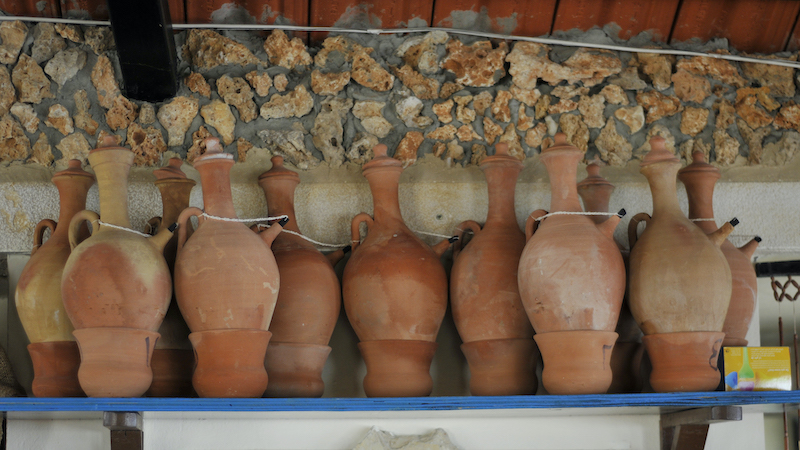Daily Office Readings for Friday, July 17, 2020:
Joshua 4:19-5:1,10-15; Rom. 12:9-21; Matt. 26:17-25
He said, ‘Go into the city to a certain man, and say to him, “The Teacher says, My time is near; I will keep the Passover at your house with my disciples.” ’
Admittedly, as a hospital pathologist my job is to work with medical puzzles, whether they are surgical path specimens or clinical laboratory findings…so it’s no surprise the “nameless folks” in the Bible (as in our Gospel reading today) always intrigue me. Who were they? What do they have to tell us that’s not apparent in the story? And how are the disciples going to find that certain guy in a crowded place like Jerusalem, to get together for a meal at a time things are getting really dangerous for Jesus?
The Mark and Luke versions (Mark 13, Luke 22) of this story provide another clue. He’ll be carrying a water jug. Now, in a world where you and I can walk down just about any street these days and see someone carrying a bottle of water, we’re thinking, “Oh, riiiggghht…yeah, sure, THAT’s really gonna narrow it down. NOT.”
Ah, but as is often the case, the cultural nuances fly right past us. You see, carrying water around was women’s work. Guys didn’t carry water around. So in some ways, to the disciples, this guy will stick out like a sore thumb.
I wonder what it was like, being that certain guy, hanging around on a street corner in the middle of Jerusalem, holding his water pitcher, waiting for the disciples to show up? He clearly didn’t know them, otherwise, Jesus would have said, “Go to such and such a street and look for Moishe, he’ll take you where you need to go.” The man is clearly someone known to Jesus but not known to the group as a whole.
More specifically, I wonder what it felt like to be a guy holding a water pitcher on a busy street, where everyone could SEE him holding a water jug, as he waits for some unknown guys to come by and say, “Jesus told us to come see you.” I wonder what else people were saying to him in the street? Were people giving him strange or disapproving looks? Were they taunting him with girly-man sorts of taunts, catcalls, whistles? Was he gay, straight, het, cis? What kinds of grief did he have to put up while he was waiting?
That certain guy clearly was a follower of Jesus; otherwise he wouldn’t be part of the story. Was he an innkeeper (that might have given him a tiny bit of a social pass to be toting a water jug around), well known in the community…or was he “just a guy,” a nobody on the streets of Jerusalem, blending in with the crowd, letting Jesus use an unused room at his house? (Well, as much as a man hauling around a water jug would have been, anyway.) Maybe he waited longer than he expected he’d have to and started wondering if Jesus hadn’t pranked on him and no one was coming, and he was starting to feel like a fool.
We don’t know his name, but he becomes important to the story, because he is the provider of hospitality for Jesus and the disciples to share one of the most intimate meals they will have, at a time of holy significance–the Passover–and he was willing to be seen by the world on a lower rung of the social ladder, possibly even enduring derision, so he could be found by strangers.
“That certain guy with the water jug” becomes an icon through which we can ask ourselves a hard question–How willing are we to stick out in the crowd to be found by Jesus’ disciples, to provide hospitality for Christ himself? My bet: many of us (myself included) are not accustomed or desirous of such a prospect. None of us like to look “too uncool, too much, for too long.” Perhaps at times it feels like no one’s coming that will recognize us, and we’ve been pranked. Yet God’s work of restoration doesn’t necessarily work on our time frame. Deep down inside we want the act of showing Jesus hospitality to feel good, not feel awkward. Yet it is awkward, more than we care to admit..and yes, it can lead to derision and catcalls sometimes.
At the same time, I suspect when that certain guy was seen, was recognized, he felt relief. I suspect that’s how anyone who is marginalized for any reason feels, when they finally are seen, finally are heard. Whether we are the one with the jug, waiting, or the one looking for the guy with the jug, may we always remember that the discomfort leads to a place where true refreshment and a chance to be at table with Jesus.
When is a time you were the one holding the jug, waiting? When is a time you were the one looking for the guy with the jug?
Maria Evans splits her week between being a pathologist and laboratory director in Kirksville, MO, and gratefully serving in the Episcopal Diocese of Missouri , as the Interim Pastor at Christ Episcopal Church, Rolla, MO.

